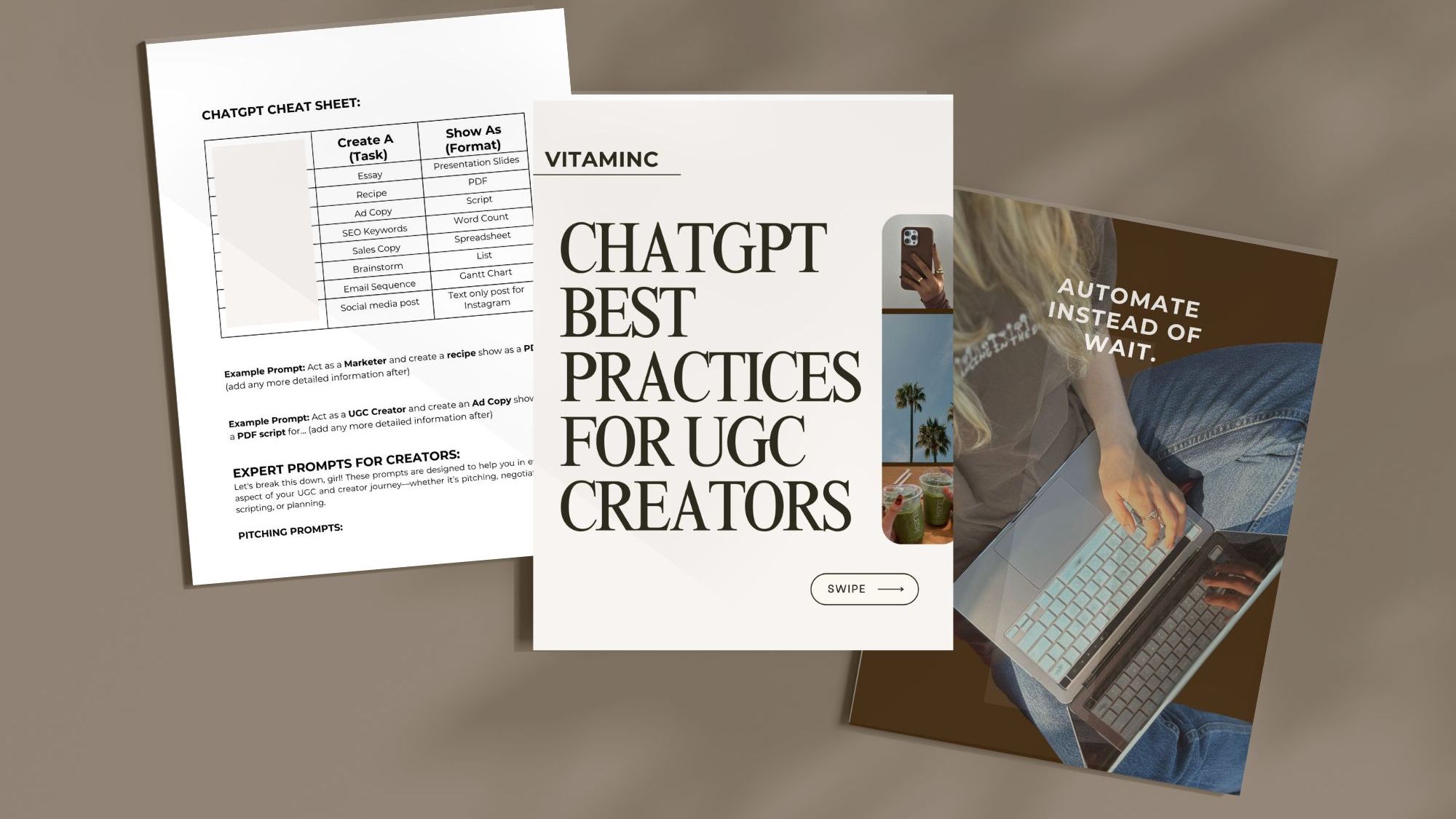Why Every UGC Creator Needs a Contract | UGC Best Practices
Jan 26, 2025
Why Every UGC Creator Needs a Contract: Terms, Best Practices, and Insider Tips
Let’s be real: if you’re creating content without a contract, you’re taking a massive risk. Contracts aren’t just paperwork—they’re your best friend, your power move, and the ultimate way to protect your time and creativity. Whether you’re fresh on the scene or a seasoned UGC pro, having a solid contract is the difference between being a top-tier creator and just getting by.
This post breaks down why contracts are an absolute must, the key terms every UGC creator should know, best practices to nail your agreements, and insider tips from the VITAMINC team that’ll have you handling business like a boss. (P.S. We’re not lawyers, but we’ve got practical strategies that WORK.)
Why Do UGC Creators Need Contracts?
Think of a contract as your safety net. It’s the written agreement between you and the brand that ensures everyone knows what’s happening—no surprises, no drama. Here’s why you should never skip it:
1. Protects Your Creativity
You worked hard on that content! A contract ensures brands can’t use it beyond what you agreed on (like extending a campaign without paying extra). Without one, they could profit off your work indefinitely.
2. Defines What You’re Delivering
Avoid miscommunication and last-minute requests by clearly laying out the number of videos, photos, and edits expected. This stops brands from sneaking in “just one more thing.”
3. Locks In Payments
There’s nothing worse than chasing brands for money. A contract legally binds them to pay you as agreed. Bonus: it gives you leverage if they don’t follow through.
4. Protects You Legally
If something goes sideways, a contract has your back. It can shield you from liability if the brand misuses your content or faces legal issues unrelated to you.
Key Terms Every UGC Creator Should Know
Before you sign (or draft) a contract, make sure you understand these essential terms and clauses found in most creator contracts:
1. Deliverables
Spell out exactly what you’re creating, down to the format and style. Be as specific as possible. For example:
-
3 TikTok videos (15-30 seconds each).
-
5 product photos edited for Instagram.
-
2 minutes of raw footage.
2. Usage Rights
Usage rights give brands the permission to use UGC content in a certain way, for a certain time. They protect you from brands misusing your assets and can lay out terms for royalties + extra payments.
This is HUGE. Specify how your content can be used:
-
Organic Usage: For their social media or website.
-
Paid Ads: For sponsored posts or paid campaigns.
-
Duration: How long they can use it (e.g., 6 months, 1 year).
-
Exclusivity: Will you be restricted from working with competitors? If so, charge for it.
3. Payment Terms
Outline everything:
-
Total amount due.
-
Deposit (e.g., 50% upfront).
-
Timeline for payments (e.g., Net 30—paid within 30 days of invoice).
What is a Net 30/60 Payment Term?
The amount of time it will take for you to get paid after the agency/brand receives your invoice. Net 30 means you’ll be paid within 30 days of receipt of invoice and net 60 means 60 days after. This is why you should pay close attention to your payment terms in your contract.
4. Revisions Policy
No one likes endless edits. Cap the number of revisions (e.g., 2 rounds) and charge extra for anything beyond that.
5. Cancellation Policy
If the brand cancels halfway through, what happens? Ensure you’re compensated for work completed up to that point.
6. Intellectual Property (Copyright)
Who owns the content? Retaining your copyright means you can charge more for extended usage or exclusivity.
7. Confidentiality Clause
Protect sensitive info, especially if the brand shares pre-launch product details or strategy insights.
8. Arbitration Clause
This ensures disputes are handled privately through arbitration rather than messy court battles. It’s faster, cheaper, and keeps things professional.
9. Perpetuity
Watch out for this! It means the brand gets to use your content forever. Always charge premium rates if perpetuity is included.
10. Creative Brief
A brief is your roadmap for the project—delivered by the brand and packed with details like deliverables, target audience, and filming preferences. Read it carefully and reference it often.
11. Exclusivity Clause
Refers to the amount of time you are prohibited from working with a brand competition, this will be included in the contract. Make sure to read the fine print.
12. Force Majeure
A contract clause that frees both parties from liability in case of unforeseen events.
13. Non-Disclosure Agreement (NDA)
Keeps certain details of your collaboration confidential. This is especially important for exclusive campaigns or upcoming product launches.
14. Indemnity Clause
This is a rule that makes one party pay if something goes wrong that's their fault. This protects the other party from financial loss. Just be aware of these clauses.
Best Practices for UGC Contracts
1. Always Read the Fine Print
No matter how trustworthy the brand seems, read every clause. If something feels off, highlight the text in question and talk it over with the brand. Ask questions or negotiate changes.
2. Use Straightforward Language
Skip the legalese. Clear and simple terms make it easier for both parties to understand.
3. Personalize Each Agreement
Every project is different, so don’t rely on one-size-fits-all contracts. Tailor each agreement to match the specific deliverables and terms.
4. Use a Contract Template
Starting from scratch is a hassle. Use a trusted template and customize it as needed. (VITAMINC Academy members—we’ve got you covered!)
5. Go Digital
Platforms like DocuSign or HelloSign make it easy to send, sign, and track contracts. Plus, no one has time for printing and scanning.
Red Flags to Watch For
While most brands mean well, some contract clauses should send you running:
-
Unlimited Usage Rights: Never give away indefinite access without charging premium rates.
-
No Payment Details: Ensure payment terms and deadlines are crystal clear.
-
Vague Deliverables: The more specific, the better.
-
Unreasonable Exclusivity: Don’t let brands lock you out of working with others unless they’re paying for it.
-
One-Sided Liability: Make sure liability is shared fairly.
- Signing an NDA: Use your best judgment here, if it is a large brand it is normal practice to issue an NDA to creators to protect their creative assets and intellectual property. However, I tend to steer clear when signing an NDA whenever possible.
Insider Tips from the VITAMINC Team
1. Charge for Every Usage
If a brand wants to run ads, extend their usage, or use your content on multiple platforms, that’s extra—and it’s your right to charge for it.
2. Know Your Worth
You’re not just making videos or taking photos—you’re creating assets that drive sales and elevate brands. Price yourself accordingly.
3. Add Late Fees
A late payment clause (e.g., 10% of the invoice for every 30 days overdue) ensures brands take your deadlines seriously.
4. Be Approachable but Firm
Contracts set the tone for your professional relationship. Be open to negotiation, but don’t compromise on protecting your work.
What to Do If a Brand Won’t Sign a Contract?
It happens. Here’s how to handle it:
-
Educate Them + Reframe: Explain how contracts benefit both parties. Reframe this as a benefit to their company.
- "It's funny you say that because more brands I work with love that I have a contract. My contract is really about building trust—this way, you know exactly what you’re getting, and we both have something to refer back to if needed.”
-
Simplify: Offer a streamlined version if they’re hesitant.
- “This contract is really just a starting point to make sure the essentials are covered—simple, straightforward, and focused on what’s most important.”
-
Say No: If they’re still resistant, consider it a red flag and walk away kindly.
- “I completely respect where you’re coming from, but I’ve found that working with a contract is the best way to ensure everything goes smoothly for both of us. If that doesn’t align, I totally understand and wish you the best.”
Conclusion: Your Contract Is Your Power Move
As a UGC creator, a contract isn’t just about protecting yourself—it’s about owning your worth, setting boundaries, and running your business like a boss. By understanding key terms and following best practices, you’ll not only safeguard your creativity but also build stronger, more professional relationships with brands.
Ready to take your UGC game to the next level? At VITAMINC, we’re here to help you secure the bag and the respect you deserve. Inside the VITAMINC Academy, you’ll get exclusive access to a done-for-you UGC contract—fully customizable and professionally crafted to protect your time, talent, and energy. Not only that, but we’ll walk you through how to create one like a pro, so you’re confident when closing deals and setting boundaries with clients. It’s time to step into your power, secure those brand partnerships, and level up your business like a true professional. 🤎







